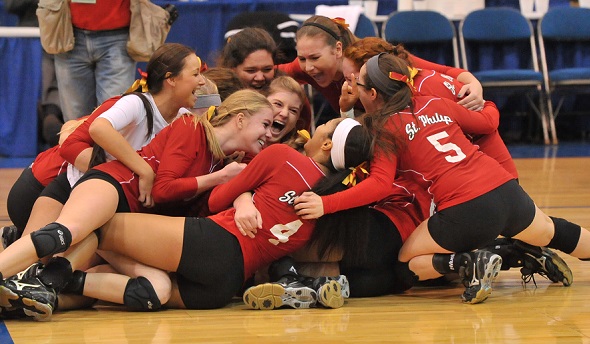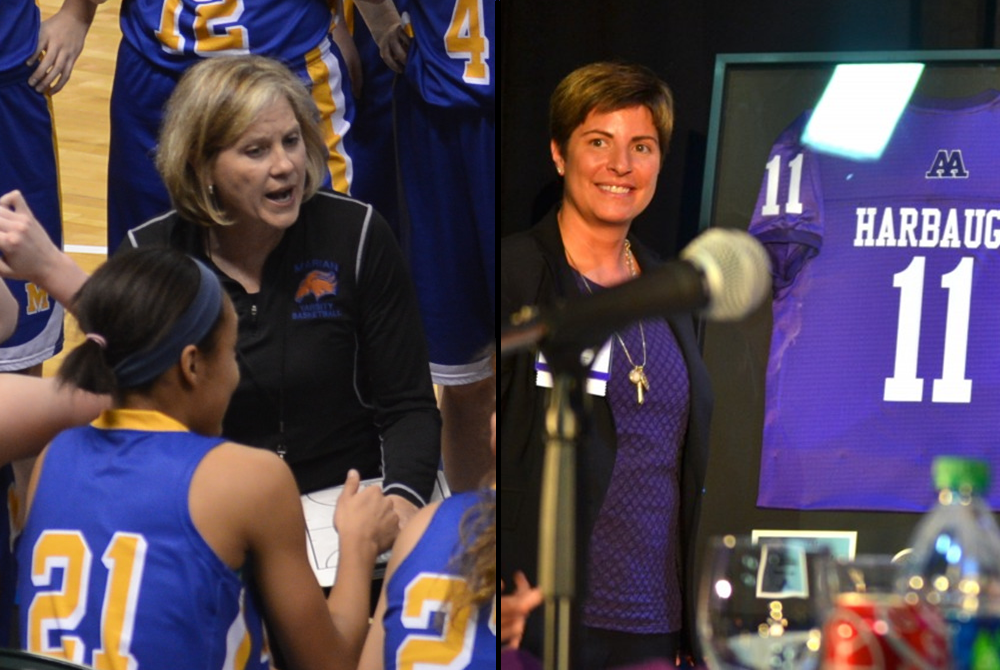
Parade of Champions 2013-14
By
Geoff Kimmerly
MHSAA.com senior editor
June 18, 2014
By Geoff Kimmerly
Second Half editor
A total of 99 schools won one or more of the 127 team Finals championships awarded by the Michigan High School Athletic Association during the 2013-14 school year – with six programs winning the first MHSAA team titles in any sport for their respective schools.
The Detroit Consortium boys basketball, Jonesville boys bowling, Croswell-Lexington girls bowling, Bark River-Harris girls golf, Farmington ice hockey and Ann Arbor Skyline boys soccer teams all brought home the first MHSAA team championships in their schools’ histories.
For the second straight school year, a total of 33 teams won their first MHSAA titles. A total of 40 champions were repeat winners from 2012-13 – and 25 of those won for at least the third straight season. The Birmingham Brother Rice boys lacrosse team has the longest title streak of 10 seasons, while the Battle Creek St. Philip volleyball team has won eight straight titles for the second-longest streak overall and longest among girls programs.
Marquette claimed the most championships, six, winning in Division 1 boys skiing, Upper Peninsula Division 1 boys cross country and girls cross country, Upper Peninsula boys swimming and diving and girls swimming and diving, and Upper Peninsula Division 1 girls track and field. Five schools won three titles apiece: Brother Rice, Bloomfield Hills Cranbrook-Kingswood, Birmingham Seaholm, Detroit Country Day and East Grand Rapids.
Sixteen of the MHSAA's 28 championship tournaments are unified, involving teams from the Upper and Lower Peninsulas, while separate competition to determine titlists in both Peninsulas is conducted in remaining sports.
For a sport-by-sport listing of MHSAA champions for 2013-14 - Click Here (PDF)
PHOTO: The Battle Creek St. Philip volleyball team celebrates at Kellogg Arena after winning its eighth straight Class D championship in November.

Record-Setting Coach, Championship Program Leader Selected for 2024 WISL Awards
By
Geoff Kimmerly
MHSAA.com senior editor
January 23, 2024
On the basketball court, no woman in Michigan high school history has led her team to more victories than Bloomfield Hills Marian’s Mary Cicerone. And few schools have stacked more championships over the last decade than Ann Arbor Pioneer under the guidance of athletic director Eve Claar.
To celebrate those accomplishments, and more significantly their impacts on thousands of students over decades in those leadership positions, Cicerone and Claar have been named the 37th and 38th recipients of the Michigan High School Athletic Association’s Women In Sports Leadership Award.
Each year, the Representative Council considers the achievements of women coaches, officials and athletic administrators affiliated with the MHSAA who show exemplary leadership capabilities and positive contributions to athletics. Cicerone and Claar will receive their awards during this year’s WISL Conference, Feb. 4-5 at the Crowne Plaza Lansing West.
Cicerone retired from coaching the Bloomfield Hills Marian girls basketball team after the 2021-22 season with a record of 707-233 since taking over the program in 1983 – making her the fourth-winningest coach in MHSAA girls basketball history, and the winningest woman to lead a program.
She guided the Mustangs to six Finals championships, in Class A in 1988, 1992, 1996 and 1998 and back-to-back in Division 1 in 2014 and 2015. Her teams also won 19 Catholic High School League Central division championships, 20 overall CHSL League titles and reached the MHSAA Semifinals seven times, also finishing Class A runner-up in 1997.
“Mary Cicerone is a legend because she’s won hundreds of games and many championships, and those measurables of her success speak for themselves,” MHSAA Executive Director Mark Uyl said. “But her commitment to her teams, her sport, and leadership in women’s athletics as a whole contributed just as significantly to her tremendous legacy.”
In addition to receiving several local and statewide coaching awards over the years, Cicerone has been inducted into Halls of Fame by the University of Detroit Mercy (2007) as a player and as a coach by the Catholic High School League (1998), Basketball Coaches Association of Michigan (2017) and Marian (2022).
She has served as an officer for the Catholic League Women’s Coaches Association and in 2009 received the CHSL’s Ed Lauer Person of the Year Award.
“Being a young girl wanting to play all kinds of activities, we never had much opportunity and I participated in whatever I was able and just felt like that was something that was important to me, my friends and everybody I was associated with was always part of the same group,” Cicerone said. “I felt like (advocating for women’s sports) was something I should do because it was so important for me, and I appreciated everything everybody did for me and my friends to be able to play.
“It’s not something I needed to do – just something I wanted to do. I stepped into that role, cherished it, worked really hard at it, and hopefully made great memories – for me, for sure – and for others.”
Claar is in her 21st year as an athletic director, and over the last decade has guided one of the state’s largest athletic programs in terms of both programs and student-athletes, with 36 varsity teams and nearly 1,110 participants. The Pioneers have had ample local and statewide success during her tenure, including claiming 16 MHSAA Finals championships across seven sports over the last eight school years (including this one). Most recently, Pioneer tied for most Finals championships among Lower Peninsula schools in 2020-21 with four, were second in 2021-22 with four more, and last school year tied for most in the Lower Peninsula again with three titles.
Claar began in athletic administration as Pioneer’s assistant director from 2003-06, and she became athletic director at Bloomfield Hills Lahser at the start of the 2006-07 school year. She took over the program at Ypsilanti Lincoln as athletic director in 2009 before returning to Pioneer in 2012.
“Eve Claar continues to show the way for her programs to succeed on the field while keeping in mind the big picture of what’s important in school sports,” Uyl said. “She’s invested in providing the best experiences for Pioneer’s student-athletes, and athletes competing throughout the Southeastern Conference, while also providing support to AD colleagues and coaches who look to her for leadership and expertise.”
Claar has served as the Southeastern Conference secretary since 2009 and is the league’s sport director for softball and field hockey. She has been president of the Michigan Field Hockey League since 2018 and has served on several MHSAA sport and site selection committees and as part of the MHSAA/Farm Bureau Insurance Scholar-Athlete Award selection committee. Before becoming an athletic director, Claar worked five years in the Detroit Pistons/Detroit Shock community relations department.
She was named a Regional Athletic Director of the Year in 2019 by the Michigan Interscholastic Athletic Administrators Association (MIAAA). In 2021, she helped found the Southeastern Conference’s Women in Sports Leadership Conference for student-athletes from the league’s 14 schools.
“I started with (longtime Pioneer AD) Lorin Cartwright before me, and she was always a mentor for me. I’ve always had female leaders and mentors whether in sports for high school, over to Pioneer, with the Shock with Nancy Lieberman – I’ve been around amazing female leaders,” Claar said. “I feel at this point, 21 years into doing this, now it’s upon me to do the same. I’ve been honored when I’ve had other athletic directors reach out, other female ADs ask for support, and I’ve been able to give the support that (my mentors) gave me.”
Cicerone is a 1978 graduate of Coopersville High School, where she was a basketball all-stater and ran track, and she then starred on the basketball court at Detroit Mercy, leading the Titans to three Association for Intercollegiate Athletics for Women (AIAW) state titles and graduating as Mercy’s all-time career assists leader while earning a bachelor’s degree in education. She won the 1982 President’s Award as U-D’s most outstanding female student-athlete.
She taught primarily physical education at Marian beginning with the 1983-84 school year through her retirement 39 years later, and also coached track & field for a season at the start of her teaching career.
Claar is a 1991 graduate of North Farmington High School and earned her bachelor’s degree in business administration from Central Michigan University and master’s from Detroit Mercy. She received a teaching certificate from Wayne State University and education leadership certificate from Eastern Michigan University, and earned her certified athletic administrator (CAA) designation in 2008. Claar played basketball, volleyball and softball at North Farmington and was a BCAM Miss Basketball Award finalist in 1990. She continued as a standout at CMU, finishing her playing career in 1995, and remains among the most accomplished 3-point shooters in program history. She also served as a graduate assistant women’s basketball coach at U-D for two seasons.
More than 800 participants – mostly female high school student-athletes from across the state – have registered to attend this year’s sold-out WISL Conference, the 26th in the series that remains the first, largest and longest-running program of its type in the country.
The opening address Feb. 4 will be presented by Cathy George, the all-time winningest volleyball coach in Michigan State University history and the first head coach of the newly-created Grand Rapids Rise professional volleyball franchise. Current MSU volleyball coach Leah Johnson will speak during the morning’s general session Feb. 5 on the conference’s theme “Share the Vision” – she finished her second season leading the Spartans in the fall after coaching Illinois State University from 2017-21 and taking ISU to the NCAA Tournament her last four seasons before leaving for East Lansing.
Several workshops will be offered over the two days, with topics including coaching, teaching and learning leadership; sports nutrition and performance, and empowerment and goal-setting. Presenters are accomplished in their fields and represent a wide range of backgrounds in sport. A complete itinerary is available on the WISL page.
The first Women In Sports Leadership Award was presented in 1990.
Past recipients
1990 – Carol Seavoy, L’Anse
1991 – Diane Laffey, Harper Woods
1992 – Patricia Ashby, Scotts
1993 – Jo Lake, Grosse Pointe
1994 – Brenda Gatlin, Detroit
1995 – Jane Bennett, Ann Arbor
1996 – Cheryl Amos-Helmicki, Huntington Woods
1997 – Delores L. Elswick, Detroit
1998 – Karen S. Leinaar, Delton
1999 – Kathy McGee, Flint
2000 – Pat Richardson, Grass Lake
2001 – Suzanne Martin, East Lansing
2002 – Susan Barthold, Kentwood
2003 – Nancy Clark, Flint
2004 – Kathy Vruggink Westdorp, Grand Rapids
2005 – Barbara Redding, Capac
2006 – Melanie Miller, Lansing
2007 – Jan Sander, Warren Woods
2008 – Jane Bos, Grand Rapids
2009 – Gail Ganakas, Flint; Deb VanKuiken, Holly
2010 – Gina Mazzolini, Lansing
2011 – Ellen Pugh, West Branch; Patti Tibaldi, Traverse City
2012 – Janet Gillette, Comstock Park
2013 – Barbara Beckett, Traverse City
2014 – Teri Reyburn, DeWitt
2015 – Jean LaClair, Bronson
2016 – Betty Wroubel, Pontiac
2017 – Dottie Davis, Ann Arbor
2018 – Meg Seng, Ann Arbor
2019 – Kris Isom, Adrian
2020 – Nikki Norris, East Lansing
2021 – Dorene Ingalls, St. Ignace
2022 – Lori Hyman, Livonia
2023 – Laurie Glass, Leland
PHOTOS Bloomfield Hills Marian coach Mary Cicerone, left, huddles with her team during an MHSAA Finals weekend, and Ann Arbor Pioneer athletic director Eve Claar welcomes John and Jim Harbaugh into the school's Pioneer Hall of Fame. (Claar photo courtesy of Ann Arbor Public Schools.)

